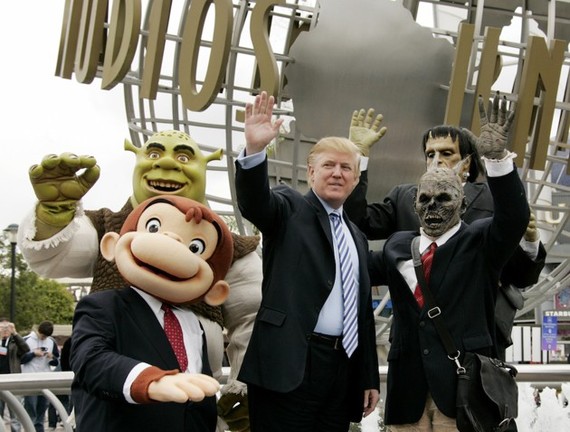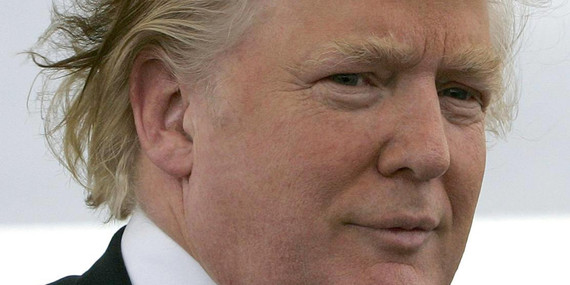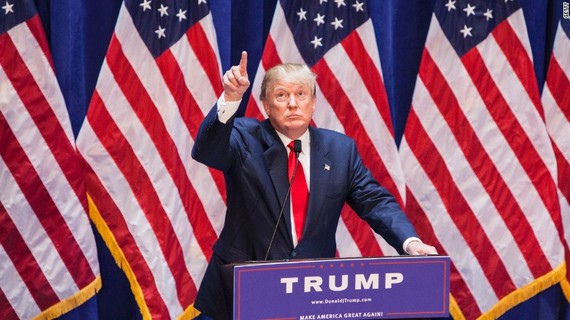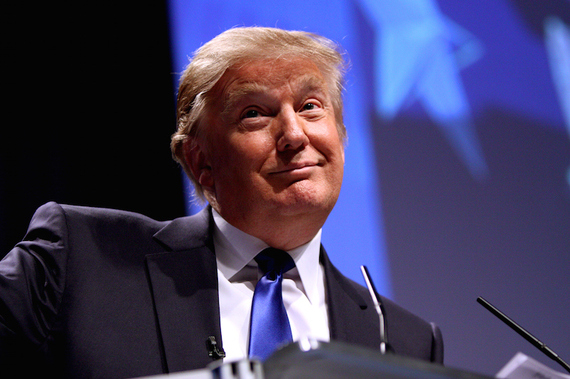If the last three weeks of presidential politics have proven anything, it's that Donald Trump is one of the nation's first "metamodern" politicians.
What this means is that Trump is neither sincere nor ironic, optimistic nor cynical, authentic nor false. Instead, Trump, like all metamodern persons and politicians, somehow manages to exist outside space, time, and controlling cultural conventions by earnestly believing in his personal metanarrative -- even as he remains conscious that no one else does. Both those voters on the Right who consider Trump a 100 percent earnest straight-talker, and those voters on the Left who believe him to be a 100 percent cynical, self-marketing buffoon are deceiving themselves and all those who listen to them. The same is true for those political pundits and journalists who are leaving their readers and viewers with no options beyond these two. Americans don't stand for having only two options for cereal brands when at the supermarket, they should hardly stand for having two or fewer options presented to them by their foremost political analysts. Trump's candidacy -- but much more importantly, America -- deserves better and more thoughtful media coverage of a presidential election.
Ardent partisans of any political stripe, whether journalists or politicians, belong to the era of postmodernism that has just ended. In the era of postmodernism, one determined one's moral position relative to society by signing onto one or another ready-made "deconstruction" of a presumptively "mainstream" narrative. For instance, despite supporting every imaginable Big Brother intrusion on personal liberties, radical conservatives fatuously styled themselves "anti-government" and hostile to a supposedly biased media apparatus (one largely dominated, in fact, by their own right-wing talk-radio and TV organs); meanwhile, equally radical Leftists overplayed their moral authority by portraying all manmade sociocultural structures in cartoonishly inaccurate terms. If the far Right abused political language by fetishizing the overheated, fact-free flame-war rhetoric of talk radio, those on the far Left turned to describing complex sociopolitical processes and phenomena using inapt binary descriptors like "silencing," "violent," and "erasing" -- none of which are sober applications of conventional semantics nor even particularly revealing of their subjects. Bad sociology is bad sociology, and bad political science bad political science, no matter how admirable the cause or stark the emotional truth behind it.
By comparison, we can note without either approval or disapproval that metamoderns like Donald Trump develop a fundamentally optimistic personal metanarrative that sometimes does and sometimes does not square with so-called objective reality. What matters in such instances is a) fidelity to a dexterous and idiosyncratic psychic pathology that permits one to move through daily tasks with hope and determination, coupled with b) an awareness of (if not an over-sensitivity to) the fact that others' mileage may vary. So when Donald Trump sets forth a laundry list of policy positions at a rally in Phoenix, Arizona, as he did three days ago, he is doing so both entirely earnestly and with full awareness that his unwillingness (or inability) to remain consistent in his policy statements over time is a choice. He believes what he is saying, but could as easily believe something different tomorrow; he savages whosoever may disagree with him but also -- if you notice -- doesn't seem to get particularly emotional about these disagreements. In Phoenix he told the crowd repeatedly that the CEO of Macy's was one of his best friends, while noting also, facetiously but also entirely seriously, that he'd likely never speak to the man again after Macy's unceremoniously dropped his clothing line. Somehow both things seemed fully "true" to Mr. Trump.
Trump speaks with equal clarity and fervor whatever his policy positions may be because he is more invested in projecting his unique entropy into the world than over-prescribing it. Notably, we found the same to be true in another metamodern politician, former Minnesota Governor Jesse Ventura, whose background as a professional wrestler gave him ample experience in making "variable sense" while being perpetually watchable, enduringly charismatic, and confident in his own metanarrative.
Ventura's persona was more cogent and cohesive than it had any right to be, as is the case with Trump. Consider, for instance, what Trump said on July 11th about universal healthcare, before a crowd of 5,000+ rabid-Right Arizonans with likely little to no interest in ensuring adequate medical treatment for all Americans:
"I know this doesn't sound very conservative, [but] we have to take care of everybody, not just the people [at the top]. We've got to take care of everybody. Get used to it, conservatives. I love you, conservatives, but get used to it. Let's take care of everybody, please... we can do it. You get rid of state lines [for insurance purposes], you have great care for much less money, the country will spend much less, and we will take care of those people who can't do it. We have to. We have to. We have to."
Whether the courage Trump displays in giving a crowd exactly what it doesn't want -- like a detailed (and rather dim) assessment of his own love life, which Trump also offered in Arizona -- is inadvertent, authentic, or merely the product of egomania is not just unknowable but beside the point. Popular culture now, as ever, responds to novelty with curiosity if not adulation when -- whatever the novelty's point of origin -- it creates an obvious risk for its purveyor. Donald Trump, whatever we might say about him, has a willingness to exhibit absolutely no sense of his surroundings or context in a way that's both bewildering and admirable; we can't simultaneously skewer career politicians for being canned and dismiss maverick tendencies as mere egomania if we want to encourage both political competence and idiosyncratic courage. Likewise, we can't be so quick to pigeon-hole the political philosophy of a man who simultaneously describes the illegal-immigrant demographic in a bigoted way and never mentions Mexico without saying how much smarter and more competent the Mexican government is than the American one. Or someone who lionizes entrepreneurship in the same breath as he threatens to levy insane tariffs on American companies who outsource because it's more profitable. There are countless examples of such Trumpian paradoxes.
Maybe Trump believes in something, maybe in nothing, but in either case he's not hiding his cards from the public or the media, suggesting there's something much stranger afoot here than mere egomania. Egomania alone doesn't build a multi-billion dollar real estate empire, put you first in several national polls and state polls in Iowa and New Hampshire, or bring a crowd of more than 10,000 to a political event in Arizona 16 months before a national election. It helps, certainly -- but it's not enough in itself. So political journalism that begins and ends with Trump's egomania (or, worse, the perceived stupidity of his core supporters) tells us less about the American temperament in the 2010s than about the sorry state of political discourse this week.
It is not so difficult, in fact, to find instances of Donald Trump going on ultra-conservative Fox News to declaim his self-admittedly reluctant pro-choice beliefs or strident anti-NAFTA tax policies; or to see video or hear audio of Trump speaking about his wealth-redistributive plan to levy a massive one-time tax on wealthy Americans; or to find Trump speaking fervently and self-assuredly about a grab-bag of conservative and progressive policy positions that simply (taken in toto) make no sense in the context of contemporary American politics. In short, howsoever he may have gotten his most explosive media coverage via his so-called "birtherism" and arguably bigoted, conspiracy theory-driven opposition to illegal immigration, in fact the longer view of Trump as political figure is that he is neither conservative nor progressive, neither a panderer nor a self-righteous demagogue, but a man-cum-politician whose personal narrative about himself permanently supersedes all political distinctions. The argument that Trump is a panderer is decimated by his bizarre unawareness of political graces, nuance, or strategy; the argument that he is a demagogue is undercut by the fact that his political views are as transient as a yellow light. Trump is Trump is Trump, whatever easy descriptors or well-worn hobbyhorses the pundits throw at him. And it is this quality, finally, that by turns fascinates and infuriates journalists, fellow politicians, and voters of all political persuasions.
It also makes him one of the most interesting -- if categorically nauseating -- politicians of this century.
Trump, while neither electable nor in any sense whatsoever a politician or man worthy of admiration, is nevertheless the canary in the coal mine for a transformation of American democracy that will take decades to unfold. We can now see, in Trump, how a certain conceptual approach to the self and society and sincerity -- a metamodern approach -- could one day produce an authentically transformative American politician.
Why Trump Stumps the Media
Trump advocating universal healthcare in front of a horde of Arizona voters who probably don't believe President Obama was born in the United States is one of the most surprising things that's happened this political season. But I had a hard time finding many stories about it online. In fact there were more stories (by far) about a pro golfer painting over the Confederate flag that sits atop his replica of the "General Lee." I'm glad that guy did that -- though I think he probably should have done it without permitting it to be such a self-aggrandizing media spectacle -- but I'll also say that one reason Americans are so apathetic about domestic politics is that when something truly strange occurs it somehow gets under-reported in the media. Remember when George W. Bush sent Secret Service goons to evict from his campaign events anyone wearing Democratic gear? Remember when the Bush Administration gave White House press credentials to a far-right blogger who turned out not only to be a fake journalist but also a gay male escort? (No? Look up the name "Jeff Gannon" on Google. I mention Gannon's sexual orientation here only because of the irony of him being admitted to the White House press corps by an Administration that equated his sexual proclivities to bestiality.)
In short, media coverage of Donald Trump has been abysmal. Just today the supposedly high-brow Atlantic gave us two (just two) options for closing the book on the Donald mere weeks into his presidential run: "plausible conservative champion" or "charlatan." Applying the incredibly deft political analysis we've come to expect from magazines whose chief byproduct is smugness rather than erudition, The Atlantic permits us to adjudicate Trump either a "conservative" or a fraud -- ensuring that if there's any story more interesting than this to be reported upon, The Atlantic will have none of it. This despite the fact that in 2015 we have come, finally, to accept that our politicians are no more or less than their public actions permit us to conclude; "journalism" that aims to psychoanalyze an unknowable like what's really in the heart of Bush, Clinton, or Trump is now and has ever been mere pap.
Now, having said all of the above, I don't like Donald Trump. I wouldn't vote for him to be President of the United States and I hope he never holds that position. I'm a Democrat, and have never voted, even once, for a non-Democrat. I expect I will support and vote for the Democratic nominee for President in 2016. While I argue below that political pundits ought to better understand and more cogently discuss the widespread appeal of Trump than they presently do -- because though he's a terrible candidate with terrible policy positions, he nevertheless inadvertently gives us a glimpse of what a genuinely transformative political figure might look like -- I do believe the lives of working Americans should never become playthings in some abstract philosophical tilt between the "politics of the past" and a hypothetical "politics of the future." In any case, as noted it isn't Trump himself who represents (at least not in any intentional way) a path forward for American politics. But dismissing Trump's candidacy out-of-hand precludes an important conversation about what it would really mean to transform American democracy.
The Donald in Context
To begin, let's state baldly what we all know to be true: the overwhelming majority of Americans have given up on trying to determine whether their elected officials are "sincere." How could we possibly know this, and how many times in the past has our certainty about the earnestness of a politician been thrown back in our faces by their subsequent malfeasance, betrayals, on-the-job "conversions," et cetera? The media keeps selling us "human interest" stories about politicians under the guise of reporting on their policy positions; real journalism tells you what a politician has done and said and offers an analysis of what they might reasonably do and say in the future without relying on armchair psychobabble to support such conclusions. Savvy voters are necessarily utilitarian now: when and as we are able, we ask our politicians to show us what they have done, and how well they understand current issues, and then use these two data points as a means of predicting a) how each politician is likely to act in the future, and b) each candidate's ability to deal with the unexpected. Today, a "Democrat" or "Republican" is not so much someone who reliably shares or does not share your values as someone who can be relied upon to share your policy positions and your priorities -- and, moreover, has a proven record of fighting on behalf of those positions and priorities.
Candidates' actual motives for doing what they do are perpetually mysterious, and remain so well beyond the shelf life of their candidacies or self-aggrandizing pre-campaign and post-campaign biographies. The "actual" motives of politicians are finally between each candidate and their conscience, and/or their intimate associates, and/or their God, or whomever. They are unknowable to the public except as they are sometimes unwisely fantasized about by certain untutored voters. Do I know what Hillary Clinton believes in her heart, and which issues she genuinely feels strongly about as opposed to merely toeing whatever line she thinks advances her candidacy? Of course not. But I'd vote for her over any Republican because her policy positions and priorities most closely align with mine. I really don't care what's in her heart (in substantial part because I am resigned to never know or understand it) as long as her actions are roughly in line with my expectations. And if I wish not to self-deceive I can only make that determination based on what she has done and said in the past.
So what happens when even those who share your policy positions and priorities can't get anything done in Washington? At that point, "Democrats" and "Republicans" become indistinguishable not because their policy positions are identical -- they're not and never have been -- but because neither has found a way to transform our system of democracy so that things actually get done.
(To be clear, the second standard of assessment mentioned above, competence, is separate from the question of effectiveness, and therefore, whatever their incapacities, it does remain the case, for now, that the top Democratic and Republican politicians are indeed more "competent" at not sending the nation into absolute chaos than are outsiders like Donald Trump, Jesse Ventura, or Ross Perot. While sometimes the collective presumption of basic competence we assign to high-level Democrats and Republicans breaks down, and with disastrous results -- think George W. Bush and the Iraq War -- it's still the case that anyone who cares about America is, for the moment, best advised to vote for a Republican or Democrat because they're less likely to make a catastrophic strategic mistake that has real-time negative consequences for everyday Americans. But just because Trump is incompetent as both a public figure and a politician doesn't mean the next politician with Trump's conceptual approach to self and society and "self-sincerity" -- which is not to say with Trump's particular political message -- won't be incredibly competent and charismatic. Journalists worth the title ought to be preparing us for this eventuality rather than doubling down on the "authentic-fraud" or "progressive-conservative" dualities we've been cheaply sold now for decades.)
So, returning to this question of a speculative "transformative politics," can anyone now doubt that the circumstances no longer exist in Washington for any politician -- no matter how smart, charismatic, or well-intended, e.g. President Obama -- to truly transform how politics is conducted at the national level? While admittedly, if the Obama Administration has taught us anything it's that even unilateral or partisan actions taken within a broken system can be beneficial to working Americans -- e.g. Obamacare -- this is different from saying that President Obama has transformed the way business is done in American politics. The President himself has cited the failure to enact this change as one of his chief regrets. I'm not saying passing Obamacare is like rearranging deck chairs on the Titanic, merely noting that the millennial generation is far less likely than the Baby Boomers or Generation X to accept the sort of small advances the President has been able to shepherd into law. The time will come when politicians are held to account for broad promises of "hope and change."
While there will always be those who support a candidate like Trump because they believe he's sending them dog-whistle signals that he, too, as they are, is a racist xenophobe, such voters are deceiving themselves more so than they are deceived by the candidate. The mistake these prospective Trump voters make is in being as naive about politics as are their counterparts on the fringe Left; they assume they know the Donald's heart when, in fact, no one does. These voters should actually be supporting far-Right politicians who have a long history of supporting their far-Right policy positions -- which is what mainstream Republicans (usually with, ironically, moderate-Right policy positions) are trying to tell them every time they highlight Trump's previous Democratic views and political donations. Voting for Trump because one thinks one has found an authentic fellow traveler and spiritual brother is indeed stupid, but while we may blithely assign stupidity to certain segments of the voting population if we wish it is much harder to also attribute deafness to these same blocs. After all, did anyone miss Trump's advocacy of universal healthcare in Arizona? Did the scattered boos Trump's comments on Obamacare received turn into universal cheers mere seconds later because those in the audience had been stripped of their prefrontal cortexes? Or was it because Trump's appeal will not, in fact, be diminished by the implicit assumption (as seen in patronizing retrospectives on Trump's previous political donations or wedding-party invitations) that Trump supporters are imbecilic rather than legitimately mesmerized by the candidate? And is it possible that metamodern politics produces a sort of "mesmerizing" phenomenon that transcends simple party and policy distinctions?
Are New "Trumpets" on the Horizon?
There may well be another bloc of potential Trump voters ("Trumpets") that manifests as the campaign season drags on, and their presence on the political landscape will confuse the media and mainstream America because these voters will be young, generally progressive, and politically apathetic. Why would such voters be excited by Trump? What qualities that Trump possesses are not being reported on widely enough by the media for the rest of us to discern them?
First, let's be honest: for all the many flaws (temperamental and policy-related) that disqualify Trump as a legitimate bet to be a good President, he's also a candid individual who doesn't dodge questions and (perhaps because he loves the spotlight) makes himself far more accessible to the media and even average voters than does a guarded, penned-in candidate like Hillary Clinton or Jeb Bush. Moreover, he uses language that voters can understand and that doesn't seem poll-tested. And he doesn't seem dogmatic -- he holds positions both Democrats and Republicans alike can find odious, as well as (though this is less reported upon) positions that Democrats and Republicans alike might agree with. Trump rightly calls politicians stupid and spineless and articulates the sense many have -- frankly, as much those on the far Left as the far Right -- that the country isn't on the right track and can be doing better. And, for what it's worth, his personal story of success and bankruptcy and resilience is, actually, more inspiring than (say) that of a George W. Bush. While he was born with a silver spoon in his mouth, Trump's repeated returns from financial ruin suggest he has, in a way, lived the American Dream that most of us know doesn't really exist anymore. To Trump's credit, he at least vaguely acknowledges both these things -- his own uniqueness and what that says about the Dream some see him as representing.
So there's certainly a basis for anyone who a) dislikes politicians' falseness and lack of candor, and b) dislikes the way politics is currently run to -- however halfheartedly -- admire Donald Trump qua politician. The question, then, is whether Trump represents (even as just a glimmer) a conceptual alteration to politics as usual that is interesting in general terms even if it isn't in the package we're currently getting it: a thin-skinned, arrogant, desperate-seeming, often careless and bombastic straight white male. And it's in this sense that, as a metamodernist, I have to say "yes." Not "yes" to Trump, but yes to the idea that the ideal politician in these times might well be someone who is so simultaneously guileless and self-aware that his (or her) very unpredictability and iconoclastic nature makes politics-as-usual impossible.
The Inevitable Institutional Chaos and Coalition-Shuffling of a Trump Administration
Again, I'd never support Trump for President. But it is fair game to imagine, with some glee, the counter-institutional coalitions Trump would be forced to forge to advance his particular panoply of policy positions. Sometimes he'd have a handful of Democrats in Congress behind him, sometimes a smattering of the Republican caucus; for some of his wackiest ideas he might even get bipartisan support -- though still such a small minority of the nation's Congress that he'd be unable to pass anything through the legislative branch. Even so, it's amusing and oddly exciting to fantasize about a President Trump trying to make good on his preposterous claim that he could get Mexico to pay for a "Great Wall" on America's southern border. Of course he can't, but would either Democrats or Republicans be particularly affronted if he did? ("A free wall to reduce illegal immigration? Okay.") Likewise, when Trump says he'd renegotiate and seal new trade deals with China, Japan, and Mexico, of course no one should believe him -- it isn't realistic and in some instances wouldn't be within his power as President -- but if he somehow found a way to get the nation a better deal on trade with, say, Japan, would anyone mind? And if so, why? Do many actually dispute that the U.S. might do better with "talented jerks" (Trump's term, per his Arizona speech) negotiating trade-deal terms with Japan than a political neophyte from the Kennedy clan? As noted at the top of this article, Trump also says he has a plan for universal healthcare that won't require government intervention and would cost the nation much less than Obamacare (though of course Obamacare is actually saving us money over the long haul). Does Trump have any such plan? Of course not. But if he did, isn't it possible that a few individuals on both sides of the political aisle would step away from their entrenched positions on American healthcare to support it?
Trump also wants a World War II-like military build-up for no more reason than to ensure that "we never have to use our military"; he clearly sees the military-industrial complex as a means to create new jobs here in America (as WWII did) while ensuring, without bloodshed, peace worldwide. It's ludicrous, of course, on all counts -- but can't we see why the very premise of such a "win-win" situation is attractive to both far-Right voters and politically apathetic would-be Leftists? The former see an anti-government but pro-military crusader, while the latter see someone who will make the establishment look silly whether or not he gets anything done. And both groups almost certainly hold out hope that there's a 5% chance Trump can do anything like what he says he can. The same is true on the matter of the environment; Trump extolls clean air and notes that factory smoke might contribute to climate change while also saying he's not a big believer in global warming -- suggesting that he'd find a way to enact reasonable environmental regulations while (to speak in colloquial, Gen-Y terms) not being a prick about it. That's not a policy position I myself hold or admire, but its appeal to certain younger demographics sick of political infighting and stasis in Washington is stronger than you might expect.
I don't intend to romanticize Trump, but rather to emphasize that, in metamodern philosophy, true transformation a) comes, however confusingly, simultaneously from outside and inside existing systems (here, Trump-the-political-neophyte coupled with Trump-the-capitalist), and b) is dexterous enough about evading entrenched positions and dialectics and structures that everyone in the existing order must respond to the game-changer rather than vice versa. Trump -- or not really Trump, but hypothetically someone much more attractive as a possible President than Trump is (temperamentally, in terms of experience, in terms of speaking well about policy specifics) -- forces others to react to him rather than being forced to play ball within the existing broken system. The first four weeks of his presidential campaign are proof that he's playing the media like a fiddle, and that voters are responding to him even when and as he isn't actually offering them a package of political positions (or even a candidate biography) they could normally get behind. One could argue that this is the most media-savvy opening to a campaign of all time, and that the reaction Trump has forced from the media (rather than the other way around) is what's propelled him to the top of several state and even a few national polls. Those who account Trump an intolerable blowhard are absolutely correct -- even as those who also account him an afterthought in this presidential election cycle may be proven great fools in time. Trump is by no means the political candidate we've been waiting for, but his implicitly "metamodern" philosophy of the self, society, and "self-sincerity," whether studied or fortuitous, is one that will be a player in American politics for many decades to come.
Seth Abramson is an Assistant Professor at University of New Hampshire, the Series Co-Editor for Best American Experimental Writing, and the author of several books, most recently Metamericana (BlazeVOX, 2015).





